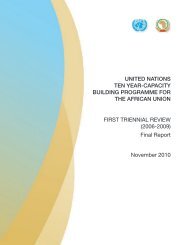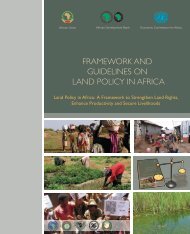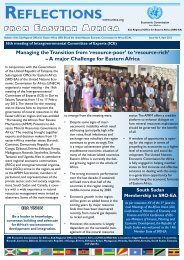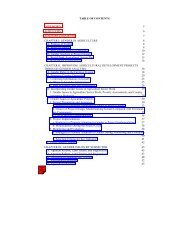A Decade of NEPAD - Economic Commission for Africa - uneca
A Decade of NEPAD - Economic Commission for Africa - uneca
A Decade of NEPAD - Economic Commission for Africa - uneca
Create successful ePaper yourself
Turn your PDF publications into a flip-book with our unique Google optimized e-Paper software.
2 A <strong>Decade</strong> <strong>of</strong> <strong>NEPAD</strong>: Deepening <strong>Africa</strong>n Private Sector and Civil Society Ownership and Partnership<br />
ten years, pilot initiatives and numerous consultations<br />
with continental stakeholders have explored how best to<br />
make <strong>NEPAD</strong> a people-centred programme, where <strong>Africa</strong>’s<br />
citizens feel ownership <strong>of</strong> the programme and its projects,<br />
and <strong>Africa</strong>n stakeholders partner with one another – and<br />
with international partners, to achieve the aims <strong>of</strong> the<br />
<strong>NEPAD</strong> plan <strong>of</strong> action.<br />
The Forum on <strong>NEPAD</strong>: Enhancing Ownership and Partnership<br />
Held as an adjunct workshop following the convening<br />
<strong>of</strong> the 10 th UN Regional Coordinating Mechanism, the<br />
theme <strong>of</strong> the one day Forum on <strong>NEPAD</strong> was “Enhancing<br />
<strong>Africa</strong>n Ownership and Partnership to Move the <strong>NEPAD</strong><br />
Agenda Forward”.<br />
The “Forum on <strong>NEPAD</strong>” report illustrates the timeliness<br />
<strong>of</strong> the theme and the need <strong>for</strong> further review <strong>of</strong> the issues<br />
that still surround ef<strong>for</strong>ts to stimulate grassroots support<br />
<strong>for</strong> <strong>NEPAD</strong> in <strong>Africa</strong>, particularly among civil society<br />
ranks and the <strong>Africa</strong>n private sector:<br />
<strong>NEPAD</strong> was launched by the <strong>Africa</strong>n Heads <strong>of</strong> State and<br />
Government in 2001 with a great deal <strong>of</strong> enthusiasm and<br />
optimism. Much <strong>of</strong> this optimism was based on the belief<br />
that it constituted a more realistic, <strong>Africa</strong>-owned and<br />
<strong>Africa</strong>-centred development framework with a greater<br />
potential <strong>for</strong> success. It was also believed that <strong>NEPAD</strong><br />
addresses the shortcomings <strong>of</strong> the unsuccessful continental<br />
development frameworks and programmes that<br />
preceded it.<br />
As a “Programme <strong>of</strong> the <strong>Africa</strong>n Union” (AU), <strong>NEPAD</strong><br />
was designed to guide fundamental continent-wide socioeconomic<br />
development by eradicating poverty and underdevelopment<br />
and reducing <strong>Africa</strong>’s marginalization in the<br />
global community. More fundamentally, it was designed<br />
as the policy framework <strong>for</strong> achieving the Millennium<br />
Development Goals (MDGs) adopted in 2000, a year be<strong>for</strong>e<br />
<strong>NEPAD</strong> was launched.<br />
According to the <strong>NEPAD</strong> framework document, <strong>NEPAD</strong><br />
is envisaged as a “vision <strong>of</strong> an <strong>Africa</strong>n-owned and <strong>Africa</strong>nled”<br />
(para 60) development programme through which<br />
<strong>Africa</strong>n leaders are setting an agenda based on national<br />
and regional priorities “prepared through participatory<br />
processes involving the people” (para 47).<br />
As the first decade <strong>of</strong> <strong>NEPAD</strong> draws to a close with many<br />
<strong>of</strong> <strong>NEPAD</strong>’s programmes still very much in their infancy,<br />
the confluence <strong>of</strong> national preparation, sub-regional interest,<br />
global economic opportunity, and international donor<br />
and lender support are poised to usher in a new decade<br />
<strong>of</strong> accelerated implementation and programme delivery.<br />
Hence, the core principles <strong>of</strong> <strong>NEPAD</strong> include:<br />
ӹ <strong>Africa</strong>n ownership and leadership, as well as broad and<br />
deep participation by all sectors <strong>of</strong> society;<br />
ӹ Anchoring the development <strong>of</strong> <strong>Africa</strong> on its resources<br />
and resourcefulness <strong>of</strong> its people;<br />
ӹ Partnership between and amongst <strong>Africa</strong>n peoples;<br />
ӹ Forging a new international partnership that changes<br />
the unequal relationship between <strong>Africa</strong> and the developed<br />
world; and<br />
Furthermore, it is believed, as stated in paragraph 5 <strong>of</strong> the<br />
<strong>NEPAD</strong> founding framework document, that <strong>NEPAD</strong> “…<br />
will be successful only if it is owned by the <strong>Africa</strong>n peoples<br />
united in their diversity”.<br />
Additionally, the <strong>NEPAD</strong> framework calls <strong>for</strong> the establishment<br />
<strong>of</strong> constructive partnerships between all stakeholders<br />
in <strong>Africa</strong>’s development to overcome the development<br />
chasm. This involves partnership with <strong>Africa</strong>n people and<br />
their leaders, between <strong>Africa</strong>n countries and between<br />
<strong>Africa</strong> and the rest <strong>of</strong> the world.<br />
From an overarching standpoint, progress has been made<br />
in several areas <strong>of</strong> the <strong>NEPAD</strong> programme since inception.<br />
Specifically, <strong>NEPAD</strong> has provided political and technical<br />
leadership in contributing to the development <strong>of</strong> continental<br />
sectoral policy frameworks to guide interventions in<br />
<strong>Africa</strong>’s priority sectors. These include: the Comprehensive<br />
<strong>Africa</strong> Agriculture Development Program (CAADP),<br />
Short-Term Action Plan <strong>for</strong> Infrastructure (STAP), <strong>Africa</strong>’s<br />
Science & Technology Consolidated Plan <strong>of</strong> Action (CPA),<br />
and the Environment Action Plan (EAP).







